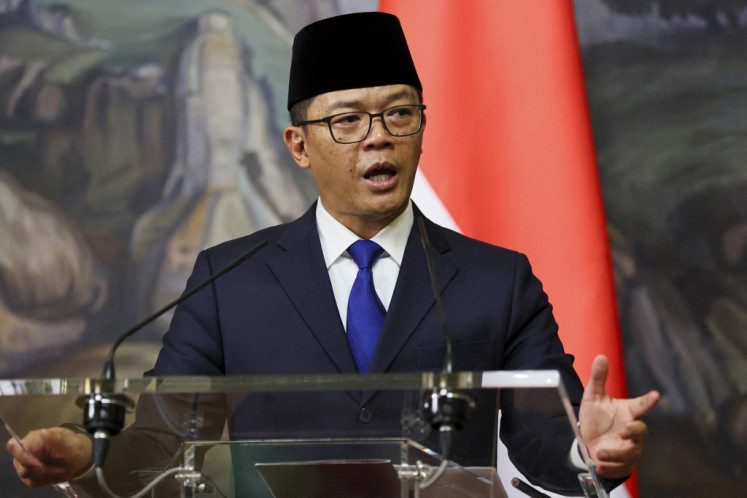Popular Reads
Top Results
Can't find what you're looking for?
View all search resultsPopular Reads
Top Results
Can't find what you're looking for?
View all search resultsOJK seeks to ease requirements for state firms to go public
The Financial Services Authority (OJK) is seeking to make it easier for state firms to go public on the Indonesian Stock Exchange (IDX) by cutting the steps necessary to do so
Change text size
Gift Premium Articles
to Anyone

T
he Financial Services Authority (OJK) is seeking to make it easier for state firms to go public on the Indonesian Stock Exchange (IDX) by cutting the steps necessary to do so.
OJK commissioner for capital market supervision Nurhaida said that the 25 steps needed for a state-owned enterprise (SOE) to hold initial public offerings (IPOs) would be reviewed and shortened to simplify the process.
The procedure for state firms to go public was still longer than the procedure for private firms, Nurhaida said, leading to reluctance to do so among SOEs.
Going public, she went on, was necessary not only for SOEs to potentially increase their capital, but also to accelerate financial market expansion and increase the liquidity of the stock market.
'The OJK has been very proactive of late in encouraging SOEs to hold IPOs. Fundamentally, SOEs already have many prospective investors interested in investing. I think that by shortening the procedures, they would be more eager, meaning greater benefits,' Nurhaida told reporters at the IDX headquarters on Monday.
The OJK, she explained, would hold comprehensive dialogues with the House of Representatives in order to help secure cuts to IPO procedures. One of the 25 procedures that an SOE must go through involves obtaining House permission.
'When we talk with the House, we want to highlight all of the financial and national advantages possible if SOEs were able to go public easier,' she added.
Nurhaida is also planning talks with the State-Owned Enterprise Ministry and main SOE shareholders to promote the OJK's plan, and expects the stock exchange itself, along with various underwriters and self-regulatory organizations (SRO), to assist as well.
'The OJK will also promote the spirit of good corporate governance to all parties that can assist in making this happen. Good corporate governance is one of the conditions that an SOE must fulfill in any case,' she noted.
Only 33 SOEs have gone public, with 22 of them listed on the IDX. The listed companies are from a range of sectors, including banking, property, telecommunications, mining and construction.
Among the big state firms listed on the IDX are lenders Bank Mandiri, Bank Rakyat Indonesia (BRI), Bank Negara Indonesia (BNI) and Bank Tabungan Negara (BTN), telecommunications operator Telekomunikasi Indonesia (Telkom), construction companies Adhi Karya and Wijaya Karya and mining firm Aneka Tambang (Antam).
Earlier in August, Nurhaida explained that the total capitalization of SOE shares in the IDX amounted to Rp 423.3 trillion. 'This figure shows the large potential funding that can be obtained by the SOE through the capital market,' she said.
By getting more state firms listed on the IDX, Nurhaida said she expected to excite the interest of local investors, in turn reducing the bourse's dependence on foreign investors, who are primarily affected by external factors.
Domestic investors account for 36 percent of investors in the IDX, according to Nurhaida. The majority of funds invested in local stocks (64 percent) are provided by foreigners.
Other advantages that an SOE can take from going public include improving the company's transparency and public image, because listed firms are entitled to announce their financial performance and corporate action plans to their public shareholders.
Elevating the role of SOEs in the economy is included in the OJK's master plan for 2015 to 2019, which includes heightening efforts for SOEs to benefit more by issuing shares or bonds, whether they be sukuk or conventional, in order to improve the competitiveness and liquidity of the capital market.









